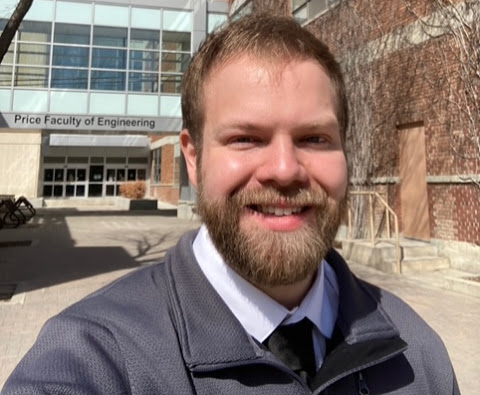As a mechanical engineering student at the University of Manitoba (opens in a new window), Stephen Moyer was drawn to biomechanical design in large part by the opportunity to help others with his skills and knowledge.
 “It might sound cheesy, but I just like helping people,” he says.
“It might sound cheesy, but I just like helping people,” he says.
It was that same thought process that drew him to Makers Making Change (opens in a new window) and its mission.
“I think all aspects of engineering help people in some way,” he shares. “[But] accessibility is all about making it so everyone can do something, like putting everyone on that more level playing field, right? So I kind of like that it’s not something necessarily just about comfort, it’s something that actually helps people.”
After graduating with a degree in mechanical engineering, Stephen was looking for work in the biomechanical design field. He had learned about Makers Making Change from his sister and decided to volunteer his time at the Winnipeg office.
He helped out three days a week with everything from 3D printing to troubleshooting with the printer.
Becoming a valued member of the team in Winnipeg, Stephen jumped at the opportunity to become an intern for the summer.
One of his first tasks was putting together a switch device selection guide (opens in a new window), to help adaptive switch users decide which switches from a variety of sources might work best for them.
He has also been working on improving the design for the Stacking Stand for R-Go Split Keyboard (opens in a new window), currently testing out different prototypes.

“There’s definitely a joy in getting to see your design actually become a real thing,” he explains. “To be able to make a design that should work in theory, and then actually test it out, find out, ‘Okay, I have to make these small tweaks here, and we should be good,’ I kind of enjoy that process.”
Designing for open source — making designs that anybody can reproduce — has been a great learning experience for Stephen.
“[It is] much more difficult when you look at it from that open source standpoint of, could anyone with a 3D printer and basic knowledge be able to do exactly that? Like having to source all the parts so that anyone could buy them somewhere, and I think that’s kind of one of the big things that I’ve learned is that challenge of designing for open source, that a project might look kind of simple at first, and then [you] realize, oh, there’s a little bit more to this,” he explains.
“I might be able to go to the hardware store and buy a certain nut and bolt, but is that nut and bolt a standardized [thing] — could anyone go get that, likely? Or is that something that might be tougher to find.”
Stephen, who is working towards his Professional Engineering designation and in his spare time plays the bagpipes with the Winnipeg Police Pipe Band (opens in a new window), wants to continue working in the assistive technology field or go into working on medical devices.
“I’ve really enjoyed it, I think one of the big things that have stood out really is the people,” he says of working at Makers Making Change. “I’d definitely say it’s just been a very welcoming crew.”
This post originally appeared on the Makers Making Change (opens in a new window) website.
